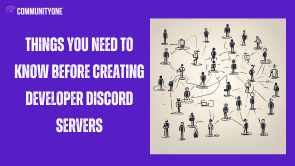Things you need to know before creating Developer Discord servers (Discord for Dev part 1)

Creating developer discord servers can be a strategic move for fostering a vibrant community of developers, whether you are a budding startup, an open-source project, or a tech company looking to engage more directly with your users. Discord, initially built for gamers, has evolved to encompass people from all walks of life, becoming an important platform for developers and various niches. It offers a unique set of tools that can help maintain and grow a developer community, but setting one up requires careful planning and understanding of what makes developer communities tick.
In this post, you will learn the essential considerations and innovative ideas for setting up a successful Developer Discord server, ensuring it becomes a valuable resource for both users and administrators.
Understanding the Basics: Support and Integration
Prioritizing Support
When developers join your official discord server, they often seek support and answers to their technical problems. It is crucial to set up your server with a support-driven approach. Initially, you might want to start with a single, well-organized support channel to manage inquiries effectively. Over time, as your community grows, you can expand your support channels accordingly.
Communityone can automatically answer member questions based on your white paper and git document. This improves efficiency and enhances the user experience by providing immediate help.
However, as your grow and the complexity of support increases, here are some ways to organize it further:
Make different categories. You can make different channels within the same support category. Depending on what you do, you can categorize it based on use cases, or make different buckets depending on developer level (especially for coding issues)
Incorporating a forum within your Discord server can significantly enhance interaction. Forums offer better search capabilities, which are crucial for developers looking for historical discussions and solutions. This setup helps in maintaining a clean and organized structure within your Discord server while leveraging the archival capabilities of forums
Git Integration
For developer communities, integrating Git-related notifications is a game-changer. Setting up notifications for pull requests and issues can keep the community engaged and informed about the project's development progress. This integration ensures that the community is up-to-date and can contribute or provide feedback when necessary.
Engaging the Developer's Communities: Jobs, Events, and More
Developer Job Boards and Resume Reviews
Creating a job board within your Discord server can significantly increase engagement. Allowing members to post their resumes and enabling projects to scout for talented developers can add immense value.
Don't be a job post board for everyone. Rather, focus on providing opportunities based on your primary programming languages. This way, you can attract the right talents. You can also use a discord bot such as freeflow to manage the job post on Discord.
Periodic resume review sessions can also benefit members with constructive feedback to enhance their career prospects. This allows your server to stand out as a programmer's hangout hub and enables you to directly connect with your potential users on a personal level.
Organizing Events (IRL & Online)
Events like hackathons are particularly effective in driving engagement and bringing new members into the server. However, you don't have to host all events yourself. You can also encourage members to organize local events or meet-ups at their local regions.
Regular Live-Streaming
If you focus more on educational content, consider setting up regular live-streaming sessions on platforms like YouTube or Twitch. These sessions can range from tutorials to live coding sessions, providing real-time interaction and learning opportunities for your servers
Don't forget to host special events, such as AMA, for just the beginners. One of the biggest complaints new developers consistently mention over multiple subreddits is how tough it is to get the requirement environment set right. Onboarding is inherently a difficult task, and you can host office hours to help these new programmers out.
Extras: Changelogs and Community Contributions
Utilizing Changelogs
Maintaining a detailed changelog is common in tech projects, and presenting it elegantly on Discord can enhance transparency and trust within the community. An effective changelog on Discord might include embedded messages with links to download new updates or packages, turning each update into a call to action.
Encouraging Community Contributions in many ways
Sometimes, direct contributions to the project can be a high barrier for new members. Encouraging them to participate in other ways, such as writing 'Getting Started' guides or translating documents, can be a more accessible entry point. This not only helps in building the community but also enriches the project's documentation and international reach.
On the non-technical side, the most satisfying way for a new user to contribute is by submitting updates on your git documents. Many Discord servers have channels such as "I-write-this" or "I build-this" to encourage members to show off what they've done. Many new programmers actually choose to write tutorial blogs to get their hands dirty on the new stack.
Have a lot of first-timers-only
Take special care of your beginners. If you want them to create a PR, always have plenty of first-timers-only tasks. Depending on their skills, you can even set up different discord roles and gate these first-timers-only tasks to the "newbie" role. The goal is to convert them into passionate advocates for your project and empower them to learn more as they conquer these tasks step by step. If you want some ideas about what kind of tasks are good for beginners, check this out.
Prioritizing Engagement: Focus on Users First
For most projects, the primary focus should be engaging users by teaching them how to use the product effectively. Contributing is quite a difficult task, and most organic contributions happen when a user faces a bug and simply can't wait for the developer team to push it out. Organizing events that educate developers about the product usage should be the priority.
